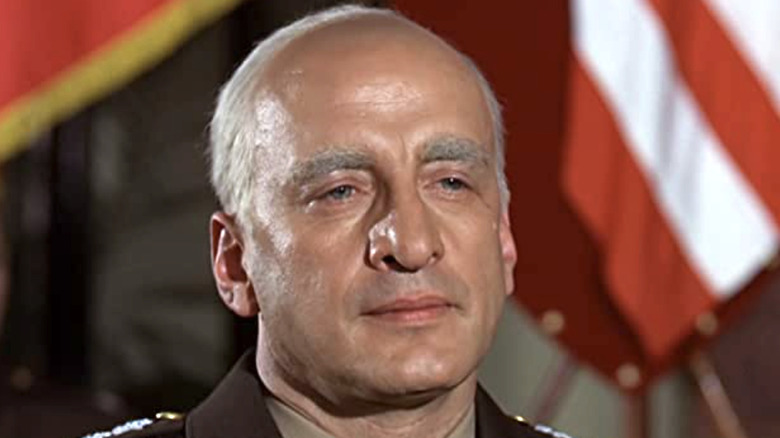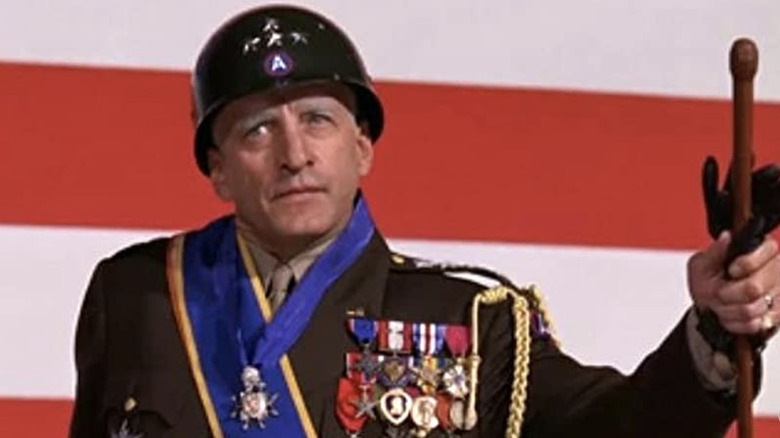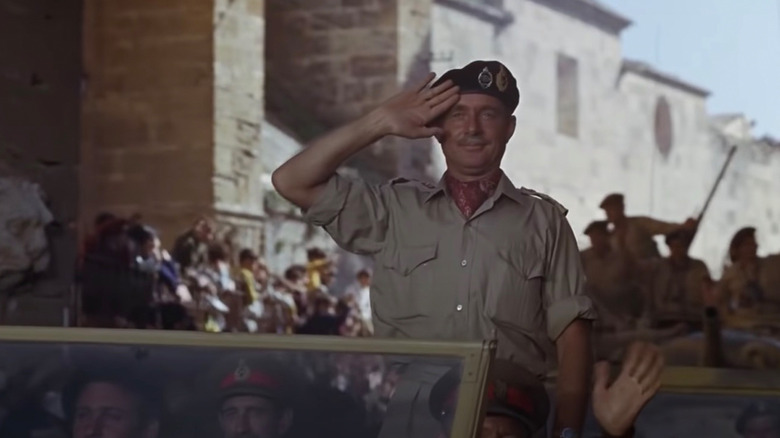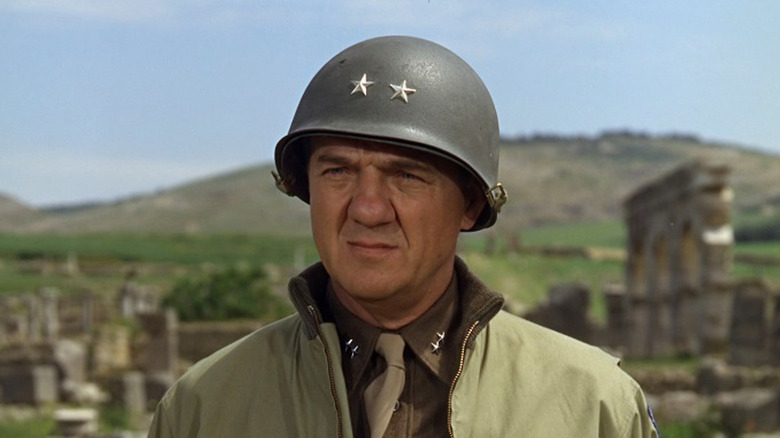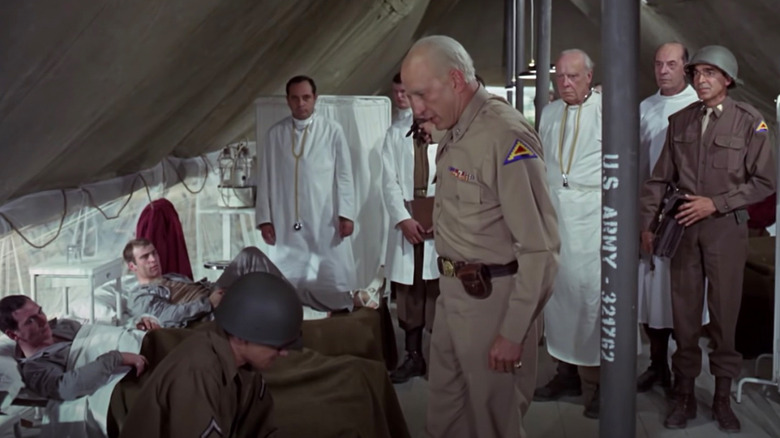How Historically Accurate Is Patton?
Released in 1970, "Patton" still holds up as one of the greatest war movies of all time. The movie tells the story of General George S. Patton's (George C. Scott) military leadership of the American armed forces during World War II, beginning with the campaign in North Africa, continuing through the invasion of Sicily and the Battle of the Bulge, and concluding with the push to Berlin and Patton's untimely death in a car accident.
"Patton," which arrived in theaters during the Vietnam War, doesn't shy away from portraying the general's military genius as well as his many flaws. Patton was such a larger-than-life character that many of his real deeds might seem exaggerated. However, much of "Patton" is based on fact. Screenwriter Francis Ford Coppola used two nonfiction books to write the screenplay: Ladislas Farago's "Patton: Ordeal and Triumph," and General Omar N. Bradley's "A Soldier's Story." Bradley was both Patton's direct superior during the war, as well as a military advisor on the film (via History Net).
Nonetheless, like all movies based on historical events, "Patton" is a mixture of fact and fiction. Here's the truth about some of the film's biggest moments.
General Patton's opening speech is not verbatim, but it is accurate
"Patton" opens with the general appearing before an American flag and addressing his unseen troops. It's one of the famous speeches in movie history. It also doesn't sound like a typical monologue from a military official — even if that person is a fictional one. The speech is vulgar and brutally honest about the challenges Patton's men will face, and he appeals to his men's sense of honor and pride to encourage them to fight as hard as they can. The speech is full of classic one-liners, including, "I want you to remember that no bastard ever won a war by dying for his country. He won it by making the other poor dumb bastard die for his country." It's also an effective way to sum up Patton as a character.
In reality, as reported by We Are The Mighty, this speech is based on several similar ones Patton made to the Third Army. The movie speech is based on the memoirs of multiple soldiers who witnessed it. It's not a word-for-word recreation, and Patton delivered multiple versions of it, but it does contain some direct quotes.
Patton's real speech is actually even more vulgar than the one he delivered in the movie, full of swears that we can't print here. Patton deliberately used "barracks language" when addressing his soldiers to deliver his point more effectively (via We Are The Mighty). "When I want my men to remember something important, to really make it stick, I give it to them double dirty," Patton once said. "It may not sound nice to some bunch of little old ladies at an afternoon tea party, but it helps my soldiers to remember. You can't run an army without profanity, and it has to be eloquent profanity. An army without profanity couldn't fight its way out of a piss-soaked paper bag."
Patton's rivalry with Bernard Montgomery is partially accurate
"Patton" suggests that General Patton and his British counterpart, General Bernard Law Montgomery (Michael Bates), were fierce rivals who intensely disliked each other. In the movie, this rivalry plays out during the Allied invasion of Sicily. Montgomery, who's in charge of the whole operation, plans to lead an attack up Sicily's eastern coast and take the city of Messina, which would give the Allies the island. Patton, unsatisfied with playing a supporting role, decides to race his forces west, capture the city of Palermo, and arrive in Messina before Montgomery, which he ultimately does.
In fact, the "Race to Messina" did happen during the invasion of Sicily, and Patton and Montgomery were rivals in real life — Patton had reason to be jealous of Montgomery, since Monty was the first Allied commander to defeat German general Erwin Rommel at the Battle of El Alamein. But the movie exaggerates the rivalry, and it omits the mutual respect between the two commanders. In his 1984 biography of Montgomery, Nigel Hamilton wrote that Montgomery admired the hard-charging and inventive American general (via The New York Times). Both men were willing to cooperate with each other when the situation called for it (via Daily History).
Finally, the scene in which Patton and Montgomery meet to plan the invasion of Sicily — before Montgomery ignores all of Patton's suggestions — never happened (via History Net).
Patton's friendship with Omar Bradley is accurate
Throughout the movie, General Patton clashes with several of his colleagues and allied officers, especially British general Bernard Montgomery. However, one character who always has Patton's back is Omar Bradley (Karl Malden). While Bradley often tries to convince Patton to rein in his worst impulses, the two have mutual respect for each other that approaches genuine friendship.
In reality, Omar Bradley both feared and disliked Patton, and Patton wasn't much of a Bradley fan, either. The two men were polar opposite in background, temperament, and personality. While Patton rose up the ranks in the armored divisions of the U.S. Military, Bradley was a long-time teacher and theorist who was partly responsible for transitioning the Army out of World War I-era tactics (via History Net). Patton came from a military family and attended the Virginia Military Institute like his father, grandfather, and several uncles and brothers (via VMI), while Bradley came from a humble Missouri background and joined the military to escape poverty (via History Net).
Patton often had a superior and "aristocratic" attitude that rubbed many of his fellow officers the wrong way. He considered himself to be a military genius and thought officers like Bradley held him back. The two men did still cooperate with each other, and Bradley is credited with managing Patton's personality effectively enough to influence the war's outcome — but they weren't successful because they were friends (via History Net).
Patton slapping a soldier is partially accurate
When the Spanish military was given the "Patton" script (as part of an arrangement for the film), they were highly skeptical that it could be real, primarily because of how it doesn't shy away from showing the man's flaws (via History Net). And arguably Patton's lowest moment in the entire movie is when he encounters a sobbing private in a field hospital. The soldier has no physical injuries, but he's suffering from what we would today call PTSD. Patton has no sympathy for the soldier. He slaps him repeatedly, calls him a coward, and orders him to be sent to the front. The incident sparks outrage and Patton is forced to apologize to his men.
This actually happened not once but twice during the Sicily campaign, according to Britannica. On August 3, 1943, Patton encountered Private Charles Kuhl at the 15th Evacuation Hospital near Nicosia. As in the movie, Kuhl had no signs of injury, and an outraged Patton berated him. Later, Kuhl was diagnosed with both malaria and dysentery. One week later, Patton encountered Private Paul Bennett at the 93rd Evacuation Hospital near San Stefano, Italy. Just like in the movie, Bennett was suffering from "combat fatigue." Patton slapped him and threatened to either send him to the front or to a firing line.
The movie also shows Patton's subsequent apology, which General Eisenhower really did order him to make (via History Net). However, the apology didn't happen in a Sicilian palace like in the movie, but in a field.
